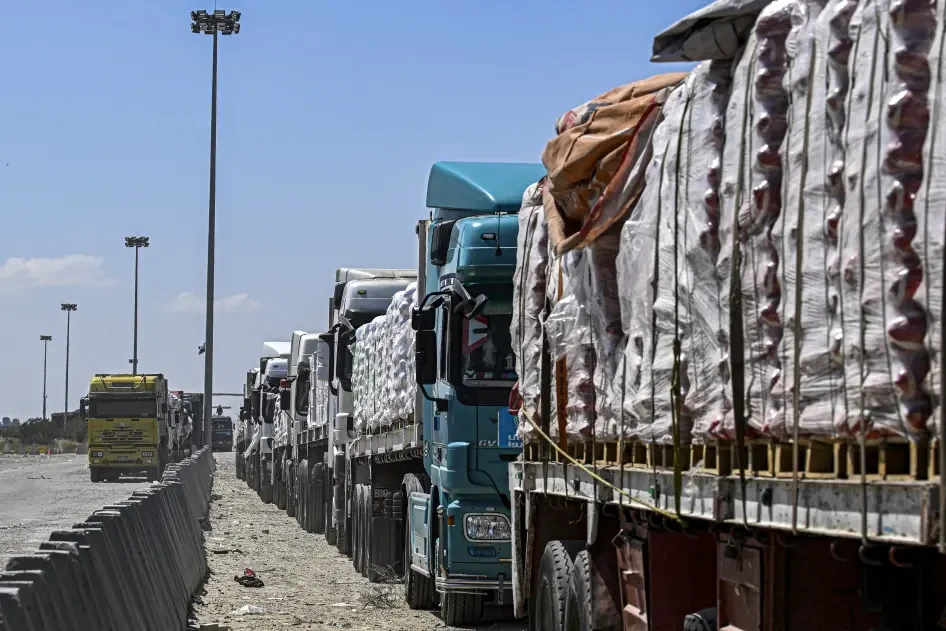What is happening with aid at Gaza's crossings?

Stay tuned with 24 News HD Android App

Aid groups say two key crossing points into the Gaza Strip have been closed for days by Israel, blocking the flow of much-needed humanitarian aid for the war-devastated Palestinian territory.
Fighting broke out on October 7 when Hamas militants launched an unprecedented attack on southern Israel, triggering the brutal ongoing military campaign in Gaza.
What is the status of the border crossings into southern Gaza?
The Rafah crossing from Egypt, one of the main humanitarian entry points into Gaza, has been shut since the Israeli army took control of the Palestinian side on Tuesday.
"The situation is quite chaotic and fast changing," said Arnaud Camilli, a supply coordinator for Doctors Without Borders (MSF).
Israel said its southern crossing with Gaza -- Karem Shalom -- was reopened on Wednesday, three days after it was shuttered due to rockets claimed by the armed wing of Hamas.
However, the MSF representative said this has not changed the reality on the ground.
"Israeli authorities have announced the opening of the Kerem Shalom crossing but due to the security situation, no aid has entered," he said.
UNRWA, the United Nations agency for Palestinian refugees, has also said no aid is entering through the southern Gaza Strip, including much needed fuel.
What about access from the north?
Israeli authorities have said their Erez crossing into northern Gaza remains open.
"Supplies getting through there remain in the north, where they are desperately needed," said Camilli.
But Alexandra Saieh, the head of humanitarian policy and advocacy for Save the Children, said access through Erez crossing has proven sporadic.
"Erez never became fully operational," she said during an online press conference.
"The humanitarian access needed to stave off famine that was projected back in March has not been granted," she added.
Additionally, aid groups have set up their offices, warehouses and logistical centres largely in the south of the Palestinian territory.
Transporting aid between the south and north, the first area targeted by the Israeli ground offensive launched on October 27, has been challenging.
Destroyed roads are one of the physical obstacles, as are the checkpoints that Israel has installed in the central Wadi Gaza area, which strictly control the movement of goods and people.
What impact has this had?
"In the last two days, virtually no aid has entered Gaza, at a time when the humanitarian needs are huge," said the MSF representative.
"There used to be an average of 40 trucks per day crossing through Rafah and that number has now dropped to zero."
Helena Ranchal with Medecins du Monde said the closures have also prevented the rotation of medical staff into Gaza, as well as the evacuation of the wounded.
Humanitarian groups also said that prices have soared in recent days, with one litre of gasoline reaching 40 euros (43 dollars) and 12 euros for a cigarette.
"We cannot collect aid" at the crossing points "because we do not have fuel," UNRWA spokesperson Juliette Touma told AFP.
Hospitals in the southern Gaza Strip have only three days of fuel left, the head of the World Health Organization warned on Wednesday.
Can the US pier improve the situation?
The United States has just completed the construction of a pier aimed at receiving aid for Gaza.
"The effectiveness of the pier is very much vulnerable to external factors, weather conditions. We still don't know what the inspections are going to be like," said Saieh of Save the Children.
"It could become another chokehold for aid," she added, noting that aid deliveries by land are more efficient.
There are a lot of uncertainties concerning the pier, which cost $320 million, and NGOs fear that the handling and delivery of aid will be given to the private sector.
There are similar concerns over the Rafah crossing.
When it was operational, aid was unloaded in the zone between Egypt and Gaza, then loaded onto vehicles driven by Palestinian aid workers for distribution in the territory.
"There's been rumours that at some point there will be a transition of the border crossing to a private company," said Jesse Marks, the Middle East senior advocate for Refugee International.
"So we're kind of walking in a pretty powerful unknown right now".
